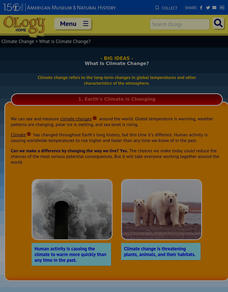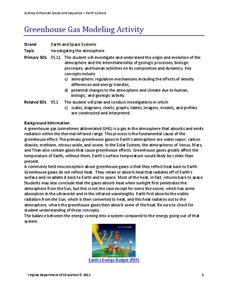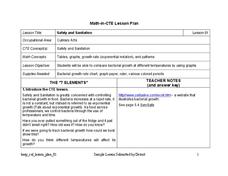Curated OER
Sorting Plastics For Recycling
First, young chemists practice polymer identification by density and flame tests. With the data collected, they propose a method of separating polyethylene from other plastics and determine what property makes it desirable for recycling....
Curated OER
The Absorption of Solar Energy
Two sequential parts to this lesson introduce your class to the electromagnetic spectrum, the ability to absorb radiant energy, and the pigments in leaves that are responsible for collecting sunlight to be used in the photosynthetic...
Curated OER
Magic Tree House: Midnight on the Moon
Take your class to the moon with Midnight on the Moon! Then provide them with this short packet to develop vocabulary and practice reading comprehension. The first page has readers match vocabulary terms to their correct definitions. The...
California Academy of Science
Global Climate Change and Sea Level Rise
Ice is nice, and its condition on the planet has a significant effect. Junior geoscientists experiment with ice melting in both water and on land to discover how each affect the rising sea level. This detailed lesson outline even...
US Environmental Protection Agency
Carbon Through the Seasons
Meteorologists view an animated video by the Environmental Protection Agency to learn how the carbon cycle works, and then move into groups to analyze and graph actual data of the atmospheric carbon dioxide concentration from Hawaii's...
Texas State Energy Conservation Office
Investigation: Crank It Up!
Following this procedure, eager engineers construct a working model of a piston system, similar to that in an internal combustion engine. Perfect for STEM or automotive technology classes, the activity comes complete with analysis and...
K-State Research and Extensions
The Crusty Earth
Geology rocks — literally! A geology chapter offers eleven activities at four different levels. Scholars enjoy completing hands-on experiments before applying critical thinking skills following a share, process, generalize, apply, and...
University of Georgia
Endothermic and Exothermic Reactions
Equip your chemistry class with the tools to properly understand endothermic and exothermic reactions. Young chemists collect, analyze, and graph data to determine how the Law of Conservation of Matter is applied to chemical composition...
American Museum of Natural History
What Is Climate Change?
So many factors show that climate change has arrived. Learners read through an online resource that explains the data and the consequences of climate change. They also review strategies for slowing or even reversing the global influence.
Curated OER
Chemistry Module 2 - Specifications
A valuable resource provides a list of concepts that young chemists should grasp. The topics include energetics, kinetics, equilibria, redox reactions, and the halogen group. Employ this as a guide for your own curriculum planning, or a...
Curated OER
Vocabulary and Concept Development: EDI
The roots metro/meter and therm are the focus of a vocabulary building presentation that includes concise definitions, color-coded examples, and opportunities for guided and independent practice. Part of a series of roots and affixes...
Outdoor Learning Center
Outdoor Survival
Which of the following can you survive without for the longest time: water, food, or a positive mental attitude? The answer may surprise you. Guide learners of all ages through games, activities, and discussions about surviving in the...
Virginia Department of Education
Greenhouse Gas Modeling Activity
Why are greenhouse gases called greenhouse gases? Young Earth scientists learn about greenhouse gases though experimentation in the second installment of a 3-part series. They use lamps to model radiant energy as well as warming through...
Curated OER
The Atmosphere
Here is a suitable set of slides to use when teaching about the layers of the atmosphere, climate, global winds, and types of clouds. These slides will support a few different lectures. You will probably want to replace the diagrams with...
Curated OER
Is Portland, Oregon Experiencing Global Warming?
Students use data to determine if the climate in Portland has changed over the years. In this weather lesson students complete line graphs and study long wave radiation.
NOAA
Communicate!: Create a Unique Message About Climate Change
Scholars use their communication skills to express their take on climate change in the ninth installment of the 10-part Discover Your Changing World series. They create ways to deliver their messages on a specific aspect of climate by...
National Research Center for Career and Technical Education
Safety and Sanitation
Your microbiologists explore the graphing of exponential growth functions using bacteria, like e. coli and salmonella, in a well-written, career and technology lesson.
NOAA
Wooly Magma
Model the earth's core with a neat activity that uses science as an inquiry and step-by-step procedures. The activity acquires a lot of assistance from the teacher or volunteer helpers.
University of Notre Dame
Safe Science Lab Safety Awareness
Prepare young scientists for the ins and outs of lab safety with a thorough list of symbols, icons, and rules about staying safe during experiments. Additionally, the resource provides several assessment pages for kids to reflect on what...
Curated OER
Safety Labels In The Chemistry Laboratory
In this science worksheet, learners examine the safety labels that are displayed in the laboratory and then are expected to complete the homework questions.
Curated OER
Water:Properties, Chapter 3
Hydrogen bonds, and polarity are described in this PowerPoint, and the reasons for tension and cohesion associated with water. The states of water under certain conditions are explained with information about the changes in density and...
Exploratorium
The Dipping Bird
If you have or want to order the dipping bird demonstration, it is useful for showing how evaporation and changes in the pressure of a closed system cause cyclical motion. After teaching about pressure, consider setting this little guy...
American College of Sports Medicine
Selecting and Effectively Using Hydration for Fitness
How much water does your body lose during exercise? How much should you hydrate during and after exercise? Address the importance of hydration with your young athletes using this informative handout.
Science Geek
Element Classes
Introduce your young chemists to alkali metals, alkali earth metals, transition metals, metalloids, nonmetals, halogens, and noble gasses with a presentation that explains the classes of elements and a few facts about each.
Other popular searches
- Physics Heat and Temperature
- Science Heat and Temperature
- Heat and Temperature Test
- Temperature and Heat
- Heat and Temperature Change
- Heat and Temperature Metal
- Heat Energy Temperature Burn
- Temperature Heat Expansion
- Temperature Scales and Heat
- Heat and Temperature Unit
- Temperature Heat
- Temperature Flow of Heat

























